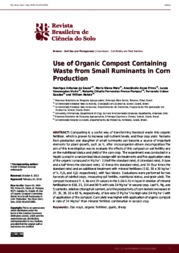Use of organic compost containing waste from small ruminants in corn production.
Use of organic compost containing waste from small ruminants in corn production.
Author(s): SOUZA, H. A. de; MELO, M. D.; PRIMO, A. A.; VIEIRA, L. V.; POMPEU, R. C. F. F.; GUEDES, F. L.; NATALE, W.
Summary: Composting is a useful way of transforming livestock waste into organic fertilizer, which is proven to increase soil nutrient levels, and thus crop yield. Remains from production and slaughter of small ruminants can become a source of important elements for plant growth, such as N, after microorganism-driven decomposition.The aim of this investigation was to evaluate the effects of this compost on soil fertility and on the nutritional status and yield of the corn crop. The experiment was conducted in a Haplic Luvisol in a randomized block design with six treatments and five application rates of the organic compound in Mg ha-1: 3 (half the standard rate), 6 (standard rate), 9 (one and a half times the standard rate), 12 (twice the standard rate), and 24 (four times the standard rate) and an additional treatment with mineral fertilizers (110, 50 e 30 kg ha-1 of N, P2O5 and K2O, respectively), with four blocks. Evaluations were performed for two harvests of rainfed crops, measuring soil fertility, nutritional status, and grain yield. The compost increased P, K, Na and Zn values in the 0.00-0.20 m layer in relation of mineral fertilization in 616, 21, 114 and 90 % with rate 24 Mg ha-1 in second crop. Leaf N, Mg, and S contents, relative chlorophyll content, and the productivity of corn kernels increased in 27, 32, 36, 20 e 85 %, respectively, of low rate (3 Mg ha-1) to high rate (24 Mg ha-1) with of application of the compost. Corn yield was higher with application of organic compost in rate of 24 Mg ha-1 than mineral fertilizer combination in second crop.
Publication year: 2016
Types of publication: Journal article
Unit: Embrapa Mid-North
Observation
Some of Embrapa's publications are published as ePub files. To read them, use or download one of the following free software options to your computer or mobile device. Android: Google Play Books; IOS: iBooks; Windows and Linux: Calibre.
Access other publications
Access the Agricultural Research Database (BDPA) to consult Embrapa's full library collection and records.
Visit Embrapa Bookstore to purchase books and other publications sold by Embrapa.

